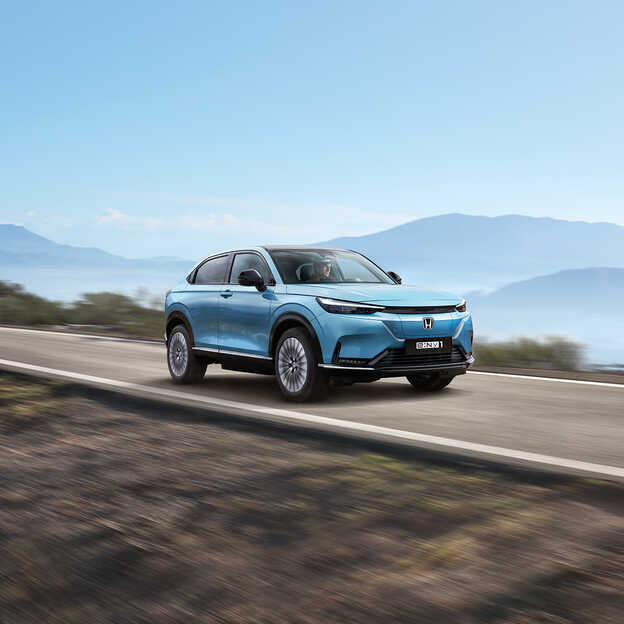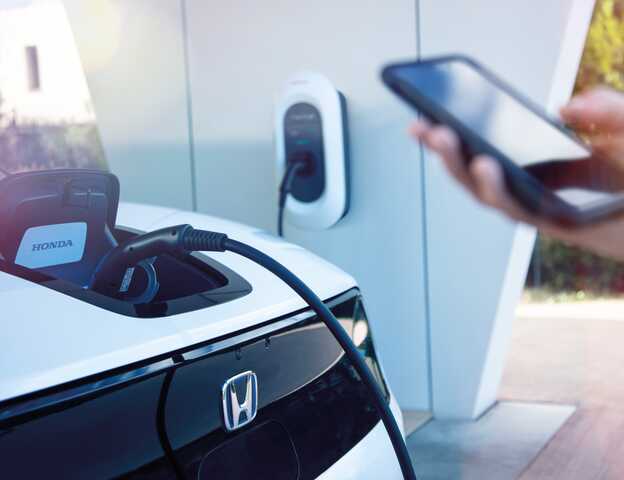Electric Vehicle Frequently Asked Questions
Starting out in the world of electric cars is exciting. You’re entering the future of driving and helping to create a cleaner planet. But if you feel a little daunted by how much there is to learn, Honda is here to help with these EV FAQs.
Here are the answers to all your burning questions about electric cars. From batteries to charging, from performance to cost, and not forgetting safety and terms, you’ll find all the electric car questions and answers in this electric cars FAQ.
What is an electric vehicle (EV)?
An electric vehicle (EV) is a car that runs partially or fully on electricity instead of petrol or diesel. It uses a battery-powered electric motor for propulsion, with energy stored in a rechargeable battery. EVs are recharged by plugging into an external power source, such as a home charger or public charging station.
How do electric cars work?
Electric cars have electric motors instead of the internal combustion engine in traditional petrol or diesel-powered vehicles. EV batteries are connected to an inverter, which transforms the DC current from the grid into an AC current. The electric traction motor then converts the AC power into mechanical energy to power the wheels.
Instead of refuelling at a petrol station, the EV battery is recharged via grid electricity. This is done through a wall socket or a dedicated electric car charge point.
How are electric car batteries made?
lthough it’s the future of driving, the technology behind EV batteries is simpler than traditional cars. These are lithium-ion batteries, with positively charged lithium ions carried by a liquid electrolyte. They travel from the anode to the cathode via a separator. The movement discharges electrical current, which powers the vehicle.
What’s the lifespan of an electric car battery?
People considering switching to an EV often have concerns about the lifespan of the batteries. Lithium-ion batteries do degrade over time. But how long do electric vehicle batteries last? Typically, you can expect around eight to ten years or 160,000km of use from an electric car. Performance doesn’t suffer much as the battery degrades, but the range may shorten over time.
What happens if my electric car runs out of battery?
Running completely out of battery shouldn’t be a problem with most modern EVs. This is because the technology gives plenty of time to find a way to charge, and the number of charge points is ever-increasing.
When your battery runs low, you’ll get a warning on the display. Some navigation systems will kick in and help you find the nearest charger.
So, how far can electric cars go when the battery reads zero? Even at 0% charge, you should be able to drive on reserve power for around eight kilometres. After that, you’ll only be able to drive at a reduced speed and use basic features. At some point, however, the car will stop running.
What is the range of an electric car when fully charged?
Most electric cars can travel between 240km and 560km on a full charge, depending on the model and conditions. According to the RAC, the average range is around 380km, which covers more than a typical week’s driving for most people.
How much does it cost to charge an electric car?
The cost of charging an electric car in Europe can vary significantly depending on several factors, including the location, the time of day, and the specific charging station used. Electric car charging costs also vary by country.
How long do EVs take to charge?
The length of time electric car charging takes varies depending on the battery and the type of charger you use. On average, it takes around 31 minutes to charge from a low-battery warning to 80% when using a rapid charger at 50kW.
Charging a typical EV from empty to full at a 7kW charge point takes just under eight hours. These are the types of chargers in service stations or outside supermarkets. The bigger the battery and the slower the charge point, the longer it takes. EV charging time using a home charger is typically longer than when you use public chargers, but you can plug it in overnight and forget about it.
Can you install an electric charger at home?
Installing an electric car charging point at home is the cheapest and most convenient way to charge an EV. Some car manufacturers offer chargers at a discount, or even for free.
You should decide between a tethered charger with a cable attached or an untethered unit without. Also, consider whether you want the charge point in view or hidden away, the length of the charging cable, and access to your home’s Wi-Fi for smart features.
Honda’s e:PROGRESS home charging system is designed to integrate with your home energy setup through an intuitive app, so your vehicle can be charged in the most efficient and environmentally friendly way.
If you’re renting a property, you would need permission to install an EV charger from your landlord. There are lots of installation packages available online, and these throw in the charging point installation cost for free when you purchase the unit.
How to use a public EV charger?
- Plug in the charging cable – your own or the one provided at the charger
- Follow the prompts on the station to start charging – this may involve payment authentication via an app or fob
- Once charged, unplug the cable and replace or store it correctly if it is your own
Can I charge an electric car in the rain?
The short answer is yes – it is perfectly safe to charge an electric car in the rain. All EV charging points and stations are designed to be completely waterproof and safe to use even in the wettest weather, meeting stringent safety standards. However, you should follow the recommended safety precautions:
- Avoid standing in water
- Avoid handling the charging cable with wet hands
- Do not plug in a wet connector
- Only use a dedicated charging station or at-home charging point – never a domestic outlet
How much does EV servicing cost?
EV servicing costs vary, depending on the vehicle and where you take it to be checked. But in general, EVs require less maintenance than Internal Combustion Engine (ICE) cars. This is because there are fewer parts inside EVs, making maintenance more straightforward.
Are all-electric cars automatic?
Almost every electric car is automatic, with a few rare exceptions. But why don’t electric cars have gears? The speed and power provided by the electric motor remain constant, so there is no need to change gears. While some experienced drivers prefer to stick to what they know and use a gearstick and clutch, driving an EV is generally easier than driving a traditional car. Learner drivers who plan to drive electric can take an automatic-only test, making the learning process easier.
Do electric cars need maintenance and oil changes?
Electric cars do need routine maintenance, which includes regular brake and tyre checks, to ensure optimal performance. However, there is no oil to change – the three fluids you will need to check and replenish are brake fluid, coolant and windshield washing fluid.
Are electric cars more expensive to insure?
Currently, electric cars are more expensive to insure than ICE cars. This is because EVs still have higher purchase prices than traditional cars. EV servicing costs and replacement parts can be expensive (particularly batteries), and there is less data available for EVs than for ICEs.
However, the cheaper the technology becomes and the more widespread EVs become, the more likely it is that insurance prices will come down. You may be able to find lower prices with an insurance company that specialises in EV insurance. Also, EVs are cheaper to run, so the overall cost of driving electric is rarely more expensive.
Related reading
Honda Electric Range Overview.jpg/_jcr_content/renditions/c2_r.jpg)
29.11.23
How Do Electric Cars Work?
.jpg/_jcr_content/renditions/c2_r.jpg)
29.11.23
How Do Electric Cars Work?

28.11.23
What are the advantages of electric cars?

28.11.23
Advantages and Disadvantages of Electric Cars
.jpg/_jcr_content/renditions/c2_r.jpg)
17.03.23
Are all Electric Cars Automatic?

23.02.23
Can I charge my Electric Car at home?

